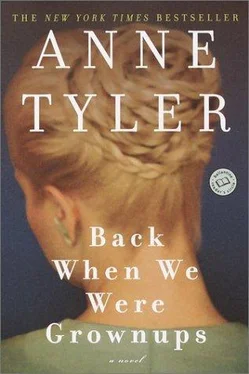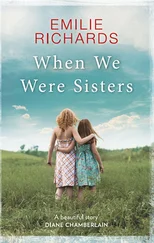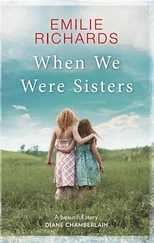She should wear a whistle around her neck for these occasions. She always threatened to do that, but then forgot until next time.
Patch and Jeep seemed to be having an argument. Or Patch was arguing; Jeep was just kicking the ground with one huge, cloddish running shoe, his fists stuffed in his rear pockets and his eyes on the trees in the distance. “Lunch, you two!” Rebecca sang out. She scooped up the youngest grandchild but then was thrown off balance, and her blanket sarong hobbled her so that they both fell, laughing, into a clump of sprinkly white flowers. Rebecca’s daughter said, “Honestly, Mom!” and helped them to their feet.
“Sorry,” Rebecca said, chastened.
Once she had been the most serene and dignified young woman. That thought came to her, suddenly. She had worn her hair in a crown of braids, and friends had complimented her on the level way she carried her head, which had made her broad figure seem almost regal. Queen Rebecca, her roommate had called her.
Well, that was all in the past now.
By the time she got back to the picnic table, Poppy had started in on the least smelly of the cheeses. “Wait, Poppy!” she told him. “We haven’t drunk the toast yet!”
“Who knows whether I’ll live that long?” he asked crossly, but he set down his knife. He was one of those old men who appear to curl up as they age, and his chin was practically resting on the table.
Biddy was constructing a still life of exotic fruits — kiwis and mangoes and papayas and something that looked like green hand grenades. “How pretty!” Rebecca told her, although she was fairly certain that no one would venture to eat any. She reached past Biddy for a bottle of champagne and handed it to Barry. “Could you please open this?” she asked him. (Always give guests some useful task, if you want them to feel a part of things.) Another bottle went to Zeb, and she put Patch to work unpacking the old-fashioned, shallow sherbet glasses that the Davitches still used for champagne.
“Why you bring real crystal to family picnics—” Patch began, but Rebecca said, “What better occasion, I ask you, than for my nearest and dearest?”
“Half will be in splinters before we leave here; mark my words,” Patch told her.
She was still upset about the engagement, Rebecca decided. It wasn’t like Patch to care if the stemware got broken. She wrapped an arm around Patch’s shoulders and whispered, “Sweetie, things will work out. We have to trust NoNo’s judgment! She must know what she’s doing.”
Unfortunately, just at that moment Barry’s cell phone rang. He pulled it from a holster on his belt and said, “Hello?” Patch gave Rebecca a meaningful stare. Rebecca just smiled noncommittally and sat back down at the table.
The children were complaining about their portions of champagne. They believed they should be given as much as the grownups, but what did they get? A tiny drop each, barely a swallow. “Once you’re legal drinking age—” Rebecca told them.
“You always let Dixon have a full glass, and he’s not legal drinking age!”
“Well, Dixon’s older than the rest of you, and besides, eighteen used to be legal.”
Jeep didn’t like what he’d been served, either; he preferred beer. “Didn’t we bring a six-pack?” he asked. “Where’s that six-pack? Geez, Patch, you know how champagne makes me burp,” and he started rummaging through ice chests.
Then Poppy took it into his head to start reciting his poem. “ You’re given a special welcome when you get to heaven late, ” he declaimed in a ringing voice.
This was the poem he’d written for his wife’s funeral, all of thirty years ago, and he never missed a chance to quote it. As often as Rebecca had heard that opening line, she mistook it every time for a reference to the Davitches’ tendency toward tardiness. So like them to be unpunctual even in death! she always thought. Although the second line dispelled that notion. “ When you’re the one who’s been left behind to mourn, ” Poppy went on, rolling his r ’s.
“Yes, but, Poppy,” Rebecca said gently, and she reached across the table for his hand. “This is actually more of a joyous occasion, you know?”
He glared at her, but he subsided. His hand had a light, hollow feel, like a dried-up locust shell, and it lay in hers without moving.
Oh, none of the others considered how every engagement on earth would have to end up, Rebecca thought. They glided right over “till death do us part.”
But she squared her shoulders, and, “So!” she cried. “Barry, NoNo, tell us how you met! This has all been such a surprise!”
Barry was just replacing his phone in its holster. He looked over at NoNo, and she slipped both hands through the crook of his arm and smiled up at him. “Well,” she began, in her scratchy little voice, “you know how I’ve always had the gift of second sight.”
Her sisters nodded, but a couple of the men were heard to groan.
“Well, I’m standing in my shop one morning, and in walks Barry. Says he wants a dozen roses. ‘Fine,’ I say, and I turn to get them, and all at once, out of the corner of my eye, I see the strangest thing. I see me, standing next to him, and I’m wearing a white chiffon wedding dress and holding a bouquet of late-summer blooms in various shades of yellow and gold — calendulas and rudbeckia and cosmos and gerbera daisies.”
Rebecca supposed it was only natural that NoNo should focus most specifically on the flowers, but even so, she couldn’t help laughing. The others looked at her. “Sorry,” she said.
“And then,” NoNo went on, “I blink and he’s alone again. Waiting at the counter and wondering what the delay is, no doubt. So I go get the roses, I bring them out, I wrap them, and all the time I’m thinking madly . Madly. And finally I say, ‘What would you like me to put on the card?’ Which is not the usual thing, of course. Usually when a customer comes in person, he doesn’t bother with a card. Or if he does, he writes the message himself. But I was afraid he was married or something. I wanted to see who the roses were meant for.”
“Only, I didn’t know that wasn’t the usual thing,” Barry said. “I told her, ‘Just write, For Mamie with love. ’”
“And I said, ‘Who is Mamie?’”
Patch stopped handing out napkins. “You didn’t,” she said.
“I did! I was brazen! And Barry said, ‘Mamie’s my secretary.’ See, it happened to be Professional Secretaries Day.”
“You send flowers to your secretary with love ?” Patch asked Barry.
He shrugged. “It’s just an expression,” he said.
Patch looked at him a moment longer and then went back to her napkins, shaking her head.
But NoNo was oblivious. “In the meantime,” she told the others, “he is taking money from his wallet, and I am thinking, Shoot, he’s paying cash! I won’t find out his name! So I write on the card, For Mamie with love, from your boss and from Elinor Davitch, who would like to get to know him better. ”
Patch sent a despairing glance toward the sky.
“Wasn’t that smart?” Barry asked, beaming down at NoNo. “She figured Mamie would ask me, ‘Who’s this Elinor Davitch?’ Which she did, sure enough. And I said, ‘Who is who ?’ and Mamie showed me the card. I said, ‘Well, I never! It must be that woman at Budding Genius.’ And I went back there after work and asked if she’d have a drink with me.”
“We hit it off immediately,” NoNo said. “I knew we would. Have I ever been wrong? Remember that time I saw a big, huge belly on Patch when she was trying to get pregnant? Remember when I asked Dixon why he was wearing a Johns Hopkins T-shirt? He said, ‘This is a Camp Fernwood T-shirt, Aunt NoNo, but I wish it were Johns Hopkins because Hopkins is my first-choice college.’ And I didn’t even know it! Nobody’d told me a thing!”
Читать дальше












